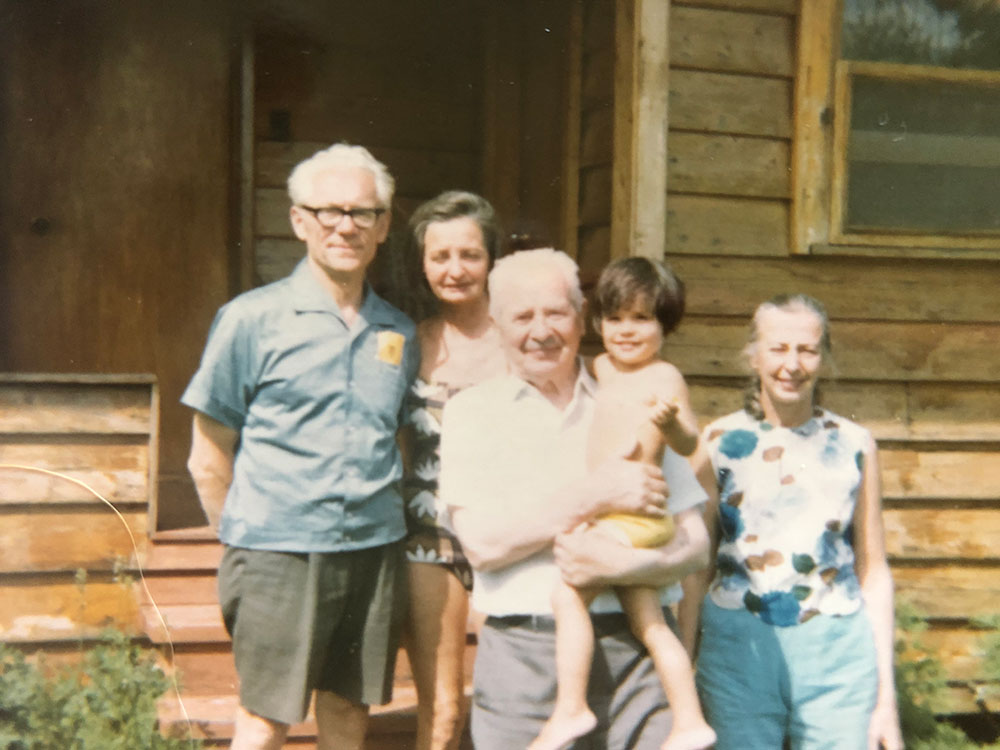
06 Feb 90 miles from stardom
(Pictured, left to right, my grandfather, Baba, great grandfather, and great aunt, and me, center, the disappointing, lazy three year old who has yet to compose his first opera)
It’s a two-hour long train ride into the city to perform for five minutes, and after you’ve finished your dinner – a much-too-salty bag of cashews from the Rite Aid because it’s the only place open at Grand Central at midnight – you hop the train home and become the guy sleeping across three seats of some stranger’s Instagram, generating outrage from a couple hundred of their followers over all that privilege you have.
It’s probably not the right time to ask them to buy tickets to your show, although at the moment I’ll try anything because I have hundreds of seats to fill, and nobody else knows who I am.
If you know me, I’ve already let you know how each one of those seats is generating another layer of panic, and that’s why a friend texts me: “It’s hard to be a star.”
It just so happens to be my birthday when she does, and the magic of Facebook’s database has me on one of those social-media-induced narcissist spin cycles.
So many people remembering my birthday? I am a star!
That lasts a blissful 15, maybe 20 seconds. Then I start to come down and the voice in my head kicks in, the one I named my show after, the voice of authority: you are in no way a star.
That’s why you’re on the train at 2am, you schmuck.
No social-media ego fix can change that reality. And my friend’s text takes on another layer. It’s hard to be a star. I feel that acutely in this moment. Maybe you know that feeling of being confounded by finding, and keeping, an audience. It’s hardly exclusive to acting, every business has to do the same thing, and it’s fundamental to success. There is no stardom without an audience. And no cash flow either.
Maybe that’s obvious, maybe I’m just thick, but at no point in my life as a developing artist has anyone ever explained this to me. Not in the arts in high school. Not at Columbia. Not in any of the study I’ve done since I graduated.
But my friend, she just got her MFA from Brown. Maybe they taught her something no one taught me. Not even my family. I grew up in a family of artists. No one mentioned this. The only thing they ever talked about was that I should do something else because I didn’t have the work ethic to make it in this business.
I work 14-hour days. Often. Often four of them are on the train.
To my family the development of craft is everything. My Ukrainian grandmother, Baba, for instance, was a concert pianist who studied at the Vienna Conservatory. In my childhood she’s at the piano from the time I wake in the morning until the end of the day. And what she sees in me she calls лінивий, the Ukie word for lazy. Give me a break, Baba, I’m six years old and it’s summer vacation.
Baba may have been intense, but I miss her every day.
She comes to see me in a play in NYC when I’m 20. Afterwards she takes me aside and says: “Everything else that you’re doing is the wrong thing. This is what you’re meant to do.”
As an influential member of the Ukrainian diaspora, Baba had a ready-made audience. If she did something, the Ukrainian community showed up. In droves.
I never really thought about it, but I suppose Baba built that audience. She contributed to that community enormously. She taught lessons, organized a festival that just passed its 50th year, fought to preserve the Ukrainian culture and language, and helped create an 11-volume encyclopedia on Ukrainian music defined by region. She gave, and they gave back.
I’ve never found a community like that for myself. Maybe my grandmother is right, maybe I don’t work hard enough. Or rather, I haven’t worked hard enough at some things because I’ve never understood until now how important they are.
When you look at people who succeed today, who build these massive social media followings, it’s easy to dismiss what they do. You can call it dumb, or shallow, or pandering to the masses, but then you’re selling them short for how hard it is to be star. Each one of those people has found and kept an audience. They’ve learned how to communicate in a way that makes people feel like they are a part of something, like my grandmother’s Ukrainian community. And they do the work required to sustain that on a daily basis.
That’s really hard. Now that I’m struggling to learn that myself, I’m awed by how hard it is. But I can find solace in my friend’s text, because I can hear in it how much she believes in me. And I can hear my grandmother’s voice through her, pushing me to work harder because this is what I was meant to do.
Dean Temple’s comedy solo show Voice of Authority, a true story about getting sued by the US Dept of Justice for $19 million and saved by the choreographer of the Metropolitan Opera, will be at the Kraine Theater in NYC Feb 21-Mar 9 (Tickets»), at 59E59 Theaters in NYC Jul 17-21, and at Surgeon’s Hall at Edinburgh Fringe Aug 2-24. Follow him on Twitter @deantemple and follow the show on facebook.com/deantemplevoa